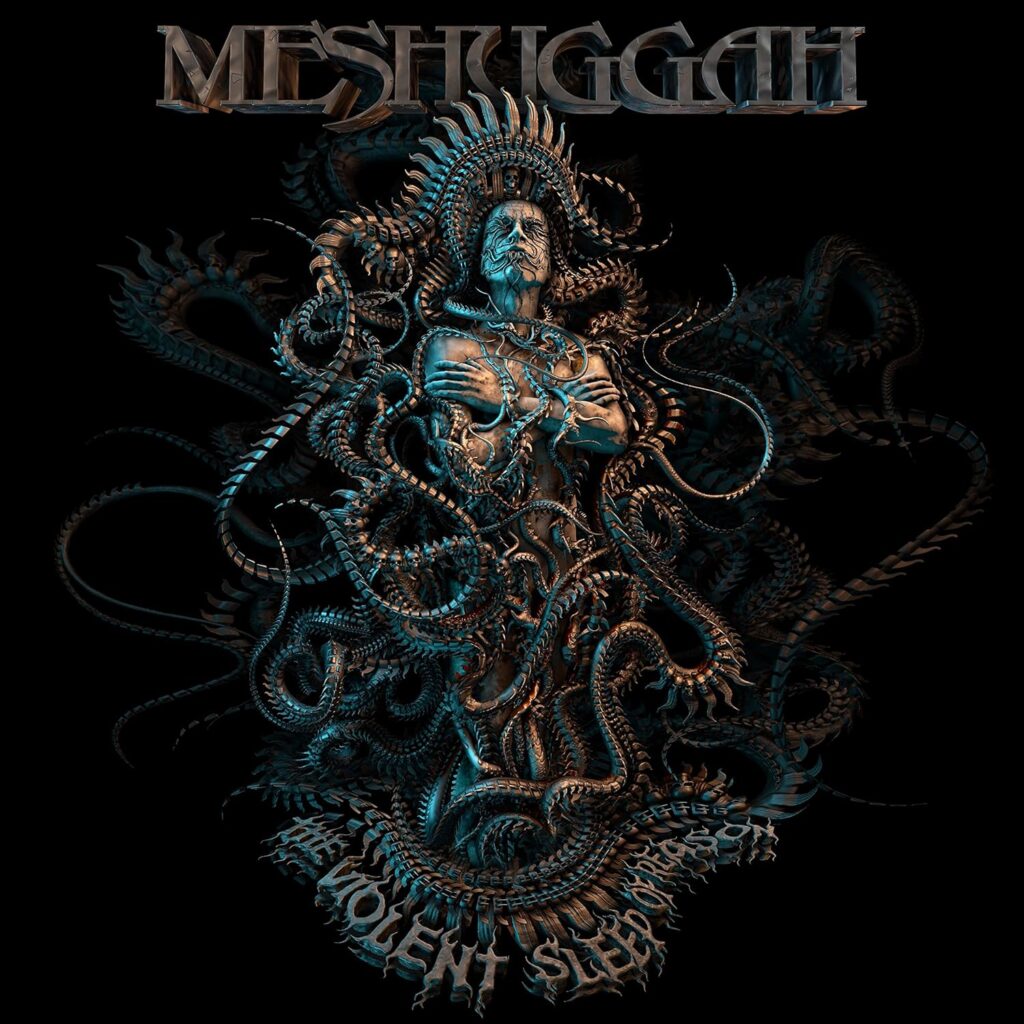
Perhaps one of the most anticipated extreme metal releases of the year, Meshuggah’s ‘the violent sleep of reason’ carries with it a darkly celebratory air that is the result of the band’s recent twenty-fifth anniversary (celebrated around Europe last December). The instant you hit play, there’s a brutally alive feel to the band’s mechanistic pummelling (although, when you think alive, think of HR Giger’s ghoulish bio-mech creations rather than a joyful child skipping past rainbows) that is utterly impossible to ignore. Like the vast majority of Meshuggah’s impressive output, ‘The violent sleep of reason’ works better as an album, absorbed in its entirety, and although such a task feels like a monumental challenge the first time you encounter the bristling opening monstrosity ‘clockworks’, the more you engage with and gaze into the abyss, the more you’ll get out of it.
An explosive opener, ‘clockworks’ is a concise summation of Mehuggah’s many strengths. At seven minutes, it is far from an easy ride, but thanks to a crystal clear production job, it’s possible to lock into the primal groove that lies at the heart of the complex polyrhythms that predominate, and it’s hard to imagine a better opening track. Most importantly, for all its complexity, ‘Clockworks’ is nigh unbeatable for sheer visceral thrill, although ‘born to dissonance’, with its taut riffing and gut-wrenching screams gives it a damn good go. ‘Monstrocity’ is aptly named, emerging as it does off the back of a riff that takes a dark groove and plunges it into an obsidian pit form which it emerges a juddering monstrosity. The percussive assault is more straight forward here but this only allows for a more complex, riff-based assault, with the result that most listeners will tie themselves gleefully in knots as they try to headbang in time to it all. Complete with a dizzying solo that sounds like Kerry King jamming on Pink Floyd whilst on a crystal meth high, ‘Monstrocity’ is now my favoured choice for a song to play at my funeral. ‘By the ton’ (presumably the units of measurement favoured when attempting to measure Meshuggah’s riffs), retains the sense of deceptive accessibility thanks to a series of brutal riffs that pack a powerful punch only to become increasingly corrosive the more closely you inspect them. At the track’s heart, however, is a ferocious performance from Jens Kidman, whose voice seems to embody a bristling sense of rage and hatred. The title track is a psychedelic highlight of the album, moving from a slithery intro that sounds like the soundtrack to a John Carpenter sci-fi extravaganza to soul-crushing metal in the space of a few short minutes. A return to the dense polyrhythmic nightmare of ‘nothing’, it’s a classic slab of Meshuggah skull-fuckery.
No less lost in a dense sense of dark wonder, ‘Ivory tower’ sees shifting rhythms threatening to undermine the listener like quicksand, whilst cyclical riffs swirl around overhead. Dense and uncompromising, this is Meshuggah at their very best and, it’s unfeasibly exciting. With bassist Dick Lovgren employing a sound that threatens to undermine the building, ‘stifled’ is a full-blown aural trepanning that drifts into an unexpectedly ambient finale before slowly segueing into the rolling devastation of ‘nostrum’. A slow-mo soundtrack to a horror movie not yet filmed, ‘Nostrum’ is a disturbing, gruelling piece of music, as is ‘our rage won’t die’. A coruscating beast built around a stuttering riff that seems to steam as it emerges from the speakers, ‘our rage won’t die’ is a firm commitment to the fans that have supported Meshuggah so long and an affirmation of their undiminished power. The album concludes with the lengthy, churning death-trip of ‘into decay’, a creeping, disturbing finale that has all the characteristics of a bad acid experience, and, as Jens’ voice leads you deeper into some dark abyss populated by slithering creatures that have no name, so the band seal you in with riffs hewn from the living rock.
Meshuggah have excelled themselves with ‘the violent sleep of reason’. Where albums like ‘Nothing’ and ‘Catch thirty-three’ emphasized complexity, sometimes at the expense of sheer visceral thrill, here Meshuggah have managed to capture both elements with terrifying ease. The music is remorseless, mechanistic in places; but where you really have to watch your back is where the band allow the mechanical elements to fall back, revealing the horror that lies beneath, and the album is both disturbing and yet ferociously exciting. Like the Geiger-esque beings that dominate the sleeve, ‘the violent sleep of reason’ is a perfect symbiosis of gruelling technical metal and a very human sense of horror, and the result is nothing short of an intimidating masterpiece before which all must bow. 9



